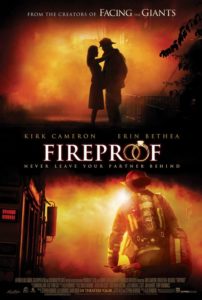Intro: again this interview is available on audio, by downloading episode 2 (right-click and select “Save As”) of Speculative Faithās new podcast, The Portal. You can also listen to Part 1 of that audio interview, or read the transcript.
[audio:http://www.speculativefaith.lorehaven.com/theportalpodcast/JillWilliamson_part2_SF_04.22.2011.mp3]
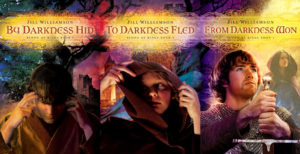 Mostly itās been difficult to break down [categories of] Christian, non-Christian; speculative, non-speculative; youth, non-youth. This one simplifies it a bit, because another one of the debates is: āhey, all this or most of this Christian fantasy and sci-fi that is out there is really YA-oriented.ā And Iāve heard a few people ask, āWhere are the God-honoring fantasy/sci-fi novels for adults?ā
Mostly itās been difficult to break down [categories of] Christian, non-Christian; speculative, non-speculative; youth, non-youth. This one simplifies it a bit, because another one of the debates is: āhey, all this or most of this Christian fantasy and sci-fi that is out there is really YA-oriented.ā And Iāve heard a few people ask, āWhere are the God-honoring fantasy/sci-fi novels for adults?ā
Do we even have a market for those yet, or should we maybe agree with Jeff Gerke, who at least said in one interview: Hey, I think the market for that is growing up right now. Weāve got all these home-schoolers, weāve got all these Christian young people who are going to grow up, and theyāre not going to want novels about buggies and bonnets and prairie romances ā they want the sci-fi fantasy weird stuff!
I think that thatās true, that when those people grow up that the market will be bigger because of that. I think that the marketās there ā itās just hard to find it. And I think perhaps it will be easier, once people figure out ā once publishers figure out how to market it, especially now with Christian bookstores not doing so well, theyāre having to think of new ways to reach their audience. And if they can figure that out, then the audience [members] are going to find the books they want. That will be interesting to see how that works out.
Speculative, for adults, does really well, but not necessarily the fantasy and outer-space genres. Like if you do a thriller, with a speculative twist, that tends to do well. I donāt know what publisher would say if theyāre looking for that kind of thing, but people read it when they can get their hands on it. And I know David C. Cook publishes several authors who do that, and Thomas Nelson does, with Ted Dekker and Robert Liparulo. And Travis Thrasher always does something strange in his books, doesnāt he? ā¦
People do want it. Publishers just donāt know how to package it and get it to the right people. Because they donāt want to buy something that they donāt know how to sell, because then they lose money and the author ends up failing in a way, because they feel like they didnāt sell as many as they should have.
What do you think of the Marcher Lord model? With e-publishing and the way that they have it set up? Is that the future, in your view, or close to the future?
Iām not sure. I think that itās really a good thing. But I get emails all the time from people telling me theyāre going to the bookstore and going to buy my book. And I have to tell them: āNo you canāt; it wonāt be there.ā So there are people who really just want to buy the book ā they just want to go to a store,Ā buy the book. And theyāre never going to find a Marcher Lord Press book in a bookstore; thatās not the way the publishing model is set up.
That doesnāt mean Marcher Lord Press isnāt successful in what itās doing ā itās doing exactly what itās supposed to be doing. But thereās publishers out there, like the bigger publishers, whoāve always done the bookstore thing. Their books will get in the bookstores.
So if they can come up with a combination of Marcher Lord Press-slash-a big publisher, and they can figure out how to use the technology so that they donāt have to warehouse so many books ā¦ it saves money to print up a bunch in advance, but then you have returns. ā¦ Theyāre all figuring out how theyāre going to use the new technology to save money all around and get books where people want to buy them, whether thatās online or in a store.
Hereās a related question, relating to the economy. I wondering, because Iāve seen conflicting statements about what happens to the speculative book market when the economy is rough. One source I [saw] said more people are looking for ways to escape their rough lives in real life, so they go read a speculative book. Then someone else says that no, books are difficult to sell even a good economy, so itās not going to work in a rough economy. What have you seen?
Well my book has only been available when the economyās been kind of rough. I think all my books have been. I think people buy books! People who like to read ā who really like to read ā keep buying books because the like them. And the Kindles and the Nooks of the world ā whereas I donāt use mine to read for entertainment as much as the many people do ā many people do use them to read for entertainment and the books are less money on there. So they can afford to buy more. And some people are just treeĀ book-shoppers. I have a couple of friends who subscribe to FamilyFiction.com, which has a section at the bottom that says whatever books are free that month, and they just stock up and they read whateverās free. Interesting plan! People are finding ways to read what they want to read.
And the Kindle ā you can loan books to your friends for a certain amount of time. ā¦ People are especially buying Kindle books. Iāve sold more Kindle books than Iāve sold paper copies of my books. Quite a bit more, I donāt know ā I would say like sixty-forty, maybe.
See, I donāt have a Kindle. At this point Iām still in that primitive mood of only wanting to get the tree books, as you called them. ā¦
I was very surprised to see them do that well; I had no idea there were that many Kindles out there.
So maybe the future is in e-publishing.
Now, Blood of Kings is finished, right? Thatās the end of the trilogy?
Yes, itās all done.
What other books are ahead, including this one that youāve sold to ZonderKidz?
The one I sold to ZonderKidz is a young-adult science fiction suspense. And I called it Jason Farms, but I think theyāre changing the name to Replication, to make it sound more sci-fi and not about a farmer, I guess! ā¦ Thatās a book about a girl whose dad moves her to Alaska, and heās a scientist, and heās taking a job there. And she snoops around and finds that heās working at a cloning lab, and that theyāve cloned the high-school jock. And she makes friends with one of the clones, and she actually had already made friends with the jock boy. So sheās going to try to help them. Thatās what thatās about. And it was a fun story.
I wrote that story before I wrote By Darkness Hid. I had that one sitting around. Thatās supposed to come out in January of 2012. That one was already written, so I didnāt have to do anything for that. I just have to wait to edit it.
How did you end up selling By Darkness Hid before this one?
I donāt think I pitched Jason Farms to anyone. I didnāt pitch By Darkness Hid to anyone either. I met [Jeff] at Mt. Hermonās conference in 2007 ā¦ and I paid him to do an editorial review on my New Recruits spy kid story, because I thought there was something wrong with it and I couldnāt figure it out. So I wanted someone to read the whole thing and give me some feedback. ā¦ And when I went to the Oregon Christian Writersā conference in 2008, there was ā as usual, for those of us who write young-adult fiction, especially young-adult speculative ā there was nobody ā no publishers or agents wanted to see young-adult anything. Thatās always frustrating, when you go to a conference, and you save money, and then itās like āNobody here wants to look at what I wrote!ā So that was the case that year.
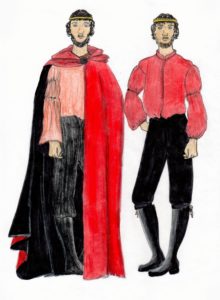
One of the author's original designs for Esek Nathak
Jeff was there, and I thought, well, at that conference you get to put in three proposals in advance, without having to try to chase down an editor and make a pitch in an elevator or something. ā¦ I wanted to take advantage of that. So I gave my first chapter of By Darkness Hid, which was called Bloodvoices at the time, to Jeff, to see what he thought of it, because I thought he was really wise about editing and story. ā¦ He wanted to see me, and he asked me why it had to be young-adult. And I said, āI donāt know! āCause theyāre sixteen and seventeen years old?ā And heās like, āEh, itās medieval! It works.ā ā¦ He asked me if it was done, and I said yeah, and so he wanted to see the full. And a couple of months later he wanted to buy it. ā¦ I had no intention of actually trying to sell it to him. But it works out that way.
I wondered, because on Marcher Lordās submission site, they say, Weāre not looking for YA. And yet hereās By Darkness Hid, which is not YA according to Jeff, but does really well with the YA demographics.
I can continue calling it young adult! I tried to sit down and think, āCould I write an adult book?ā And maybe I could. But I donāt want to. Thatās not what I feel called to do. So I just want to keep writing more books for teens.
With the ZonderKids book ā I sent more ideas over to them, and theyāre thinking about stuff. Weāll see. Iām trying to get a feel on what they might want to see next so that I decide which idea to write next.

Many fans enjoy helping promote the "Blood of Kings" novels.
Iām concerned about it a little bit. My agent seems to think that as long as I stay speculative Iāll be fine. But I might be trying to think up another fantasy novel soon, so that I can have another one out, just because I have people. And I like it! So weāll see.
But the other ideas I have right now are just all over the place. The Jason Farms is sci-fi, but I have a dystopian one and I have a time-travel one. I guess anything goes when you write speculative, right?
Yes. But are you going to be writing any novels with forlorn-looking Amish women on the front of them?
Probably not! Unless she time-travels or something. No, I donāt have any plans to do that. Iāll stay speculative.
ā¦ Iāll just throw that out for you to take on, if you want to, because I certainly want no part of it ā the time-traveling Amish. Throw in some androids or whatever. Tim Challies, the Christian blogger ā he once came up with an Amish vampire end-times novel concept. [Editor’s note: but months after this.] I thought: actually, dude, that could work.
They would know how to survive!
Thatās true! Thrown right back in time. Theyād be familiar with that lifestyle.
Do you have a favorite sub-genre within the speculative genre? It sounds like youāre just open to a lot of them, so long as itās speculative.
I donāt know if I have a favorite. I donāt think I do. ā¦ As long as itās speculative ā I like to have weird things, and obviously young-adult would be my favorite.
You think youāre going to keep writing for young adults, or ever try to branch out beyond that?
I have no plans to branch out beyond that right now. Iām going to keep going. And I find that a lot of adults like to read young-adult, maybe not in the Christian market as much as in the general market, but you find a lot of people who like to read teen books in the general market. ā¦ I might keep some of my adult readers, for a while, anyway.
Earlier, you mentioned that you feel like your calling is to write these kinds of books for teens or young-adults, even if they have broader appeal for older readers. Iām curious if you want to discuss more of what you believe your calling is, and how God has been working through your books.
Like you said, I feel like God has called me right now to write stories. And I didnāt know thatās what His plan was going to be. I had wanted to be a fashion designer, and then when I was done with that, I thought, maybe He wants me to use my story to speak to kids and be a motivational speaker or something because I grew up in Alaska and I have some interesting experiences. ā¦ And as I started to research how to get started as a speaker, writing articles is one way, and I started writing articles, and accidentally started writing that fiction book, and it was way more fun! And I did struggle with that for a while. But I feel like Godās kind of shaped me for this ā because my entire life, growing up in Alaska, Iām cursed with an overactive imagination. I feel like now I finally found a use for this overactive imagination! It works really well as a storyteller to be able to use that imagination for something productive rather than just sitting around and coming up with bizarre scenarios in my head.
There are a lot of people, and I might be one of them, who also feel cursed with an overactive imagination, but arenāt ever ā just because God has other things in mind ā arenāt ever going to get published. ā¦ He has other callings for them, involving that imagination or not. What encouragement might you have for people like that, who think yeah, maybe, kinda sort of might want to get published someday, but ultimately wonāt end up being published, yet are just as awesome and can be used by God in other ways?
Oh, thereās lots of ways to use an overactive imagination ā¦ just even working with kids. People who have an overactive imagination really relate well to kids of all ages, because kids tend to be closer to that imagination. ā¦ You could just sit there and start talking to them, and totally suck kids into your story or whatever youāre saying, if youāre talking to them on their level.
God calls us not just to specific things like writing. Overall He calls us to have relationships with people. If you can use your imagination to inspire others, or to even build friendships, who knows what you could do? I think that God wants us to care about other people, and people with overactive imaginations can do that, even though sometimes we like to be by ourselves! And maybe itās just me. ā¦ Leave the room and actually meet people, and youāll find that people like you and they like your overactive imagination. I call it being random.
Iām thinking of my wife, who used to write more stories and things like that, really enjoys speculative literature ā including yours ā but doesnāt do a lot of writing now, but she still has that imagination. I see how she gets along very well with children, just because she can, like you said, get down on their level and go, Oh really, yeah? Well how about that.
How many kids do you have? I meant to ask that earlier, actually.
I have two. My boy is nine and my girl is seven.
And ā theyāre madly in love with your books?
Well Luke is. Luke is the nine-year-old. He loves to read. Caitlyn likes to read too, but she doesnāt have the attention span to sit there and listen. Sheās just different that way.
Luke is totally sucked in. In fact, I only read him half of book three because I was reading it to him out loud as a way to proofread, but I was going too slow, and I had to drop him out of the process, because it takes longer to read it out loud and plus it takes longer to find times where heās with me where I can read it! So he keeps asking me to finish it.
Whatās it like for your kids, having the Jill Williamson as their mother?
Oh, I think it annoys them, maybe, more than anything. Luke thinks itās kind of neat; he likes my books. They both a little poster in their room ā little postcard-sized things. Luke has book one, and Caitlyn has book 2, because Vrellās a girl. But ā¦ Mommyās always on the computer ā is one of the things theyād probably prefer [not having]. ā¦ Last week, my husbandās actually been out of town, and so itās been me and the kids, and my book was turned in, and so I was able to play with them a lot more this last week. ā¦ I finally got done with it! ā¦ I actually got out on the trampoline ā¦ and jumped with them. ā¦ Itās an antique one. Iām sure somebodyās going to get injured. Lukeās getting braver ā he can do flips now.
This is one of those speculative fiction things ā we like things that are a little bit dangerous, a little bit riskier.
ā¦ How often do you try to write per day? Do you have a word count you try to reach when youāre in the middle of a project? For those listeners or readers who want to know, what are your secrets to sticking with a project?
When Iām working on actually writing that first draft, I do try to have a word count per day, and usually, crazy person that I am, will try to figure out what my overall word count goal is, and then do the math and figure out how many days I have and how many words I need to do per day. Then I try to shoot for that goal. So if I have more time, I wonāt write as much ā unless I get going. Itās always good to get ahead of yourself when youāre trying to get that first draft done. Iāll shoot for how long itās supposed to be.
Now with my new books ā Jason Farms is only about 90,000 words. I can really, truly write regular-length books! I donāt have to just write 360,000-word Marcher Lord Press books.
What was the word count for From Darkness Won?
160 or 158 [thousand], something like that.
It was actually maybe 20 pages shorter than book two. I thought that was a victory.
When you had a Tweet that said that To Darkness Fled was 160-something thousand words, I rejoiced. ā¦ I have it in my head that if you write above 100,000 words, thatās it, youāre shot, your chances are gone. But I havenāt been able to write anything thatās less than that and do integrity to what I think is the story. So thatās an encouragement to me, just personally.
Thatāll be tough to try to sell to most publishers. Theyāre kind of anti- the big books. But Jeff is not so. Thatās something thatās really cool about Marcher Lord Press is he didnāt care how long it was. The first [draft of] By Darkness Hid was only about 95,000 words when I pitched it to him, and it got longer with his edits and asking for me to add more description and things like that. ā¦ He kept saying, Oh, it doesnāt matter. We can do what we want here.
That does sound like a dream. And yet youāre going with ZonderKids now. Will you keep writing for Marcher Lord, or do you think a traditional publisher, for those who do want to go into the bricks-and-mortar store and get a tree book, is the way that youāre headed inevitably?
Iām not opposed to writing more with Marcher Lord Press. Jeff and I were actually talking about what I might write, so Iām supposed to be thinking about whatever that might be. Weāre discussing that and weāll see how that works. Maybe Iāll keep writing fantasy! Woo-hoo! ā¦ But I am going to be, hopefully, writing books with ZonderKidz too.
Well, Iām sure Iām not the only one who looks forward to seeing whatās ahead for you. And your being on the ground floor of Marcher Lord has been a blessing to all of us whoāve read and enjoyed the Blood of Kings trilogy. I say that like I donāt know it, but sometimes I have to remember: itās By Darkness Hid, To Darkness Fled and From Darkness Won.
I think I am out of questions. Unless you can think of anything else to close with ā maybe you want to say something that I didnāt think to ask you about ā do feel free. But otherwise I can let you go, get back to writing or taking care of the children or whatever your calling is this afternoon.
I donāt think I have anything else to say. Thank you for having me!
Absolutely. My guess is Iāll end up splitting this into a two- or three-part interview. And if you like I can send you the links so you can keep track of any discussion or feedback from readers. And hey, I appreciate getting to talk with you again. ā¦ How long has it been since that conference? Six, seven months?
Are you going to go this fall?
Iām going to try. Of course, the economy being rough and weāre all so morose and everything ā it may be difficult, especially since itās further away from me. But Iām going to try, because Iāve definitely been doing more this past year than I have before. ā¦ Maybe Iāll see you there. ā¦ I think they get more and more encouraging every year. Although youāre like the only author-slash-editor listed on the ACFW page who does not say: No fantasy, no sci-fi, no nothing, no paranormal, no end-times, no supernatural thrillers, nothinā.
We need to get more people willing to critique, huh?
Well, maybe. [Or] you could stay unique.
Iām fine being unique!
Iām sure thatās the case either way.
Well, I will let you sign off, and again, thank you so much.
Okay, thank you!
Talk to you later.

































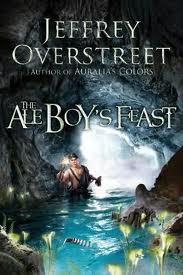




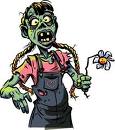





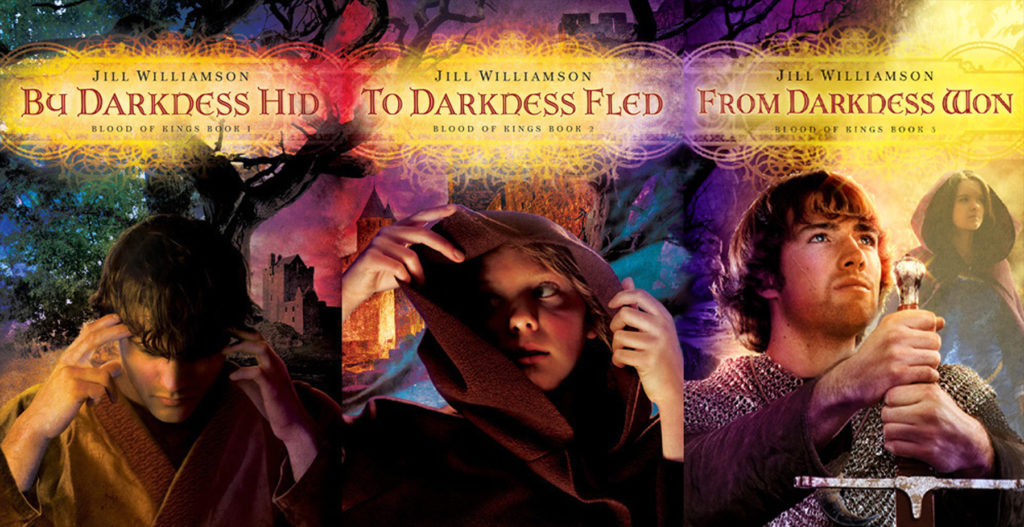




 Stop me if youāve ever heard any of this: Christians novels arenāt edgy enough. They donāt show what the world is really like. Instead we get cleaned-up, black-and-white versions of reality limited to two dimensions or less. Also, conversion scenes are clichĆ©d.
Stop me if youāve ever heard any of this: Christians novels arenāt edgy enough. They donāt show what the world is really like. Instead we get cleaned-up, black-and-white versions of reality limited to two dimensions or less. Also, conversion scenes are clichĆ©d. 
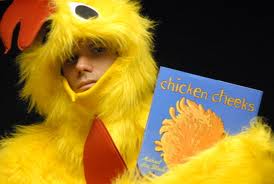





 How has your day been going?
How has your day been going? So I just stared at it for a while and thought it was really cool. And so I ran home and I Photoshopped it, as best I could. And thatās kind of the image thatās on my website header, the
So I just stared at it for a while and thought it was really cool. And so I ran home and I Photoshopped it, as best I could. And thatās kind of the image thatās on my website header, the 
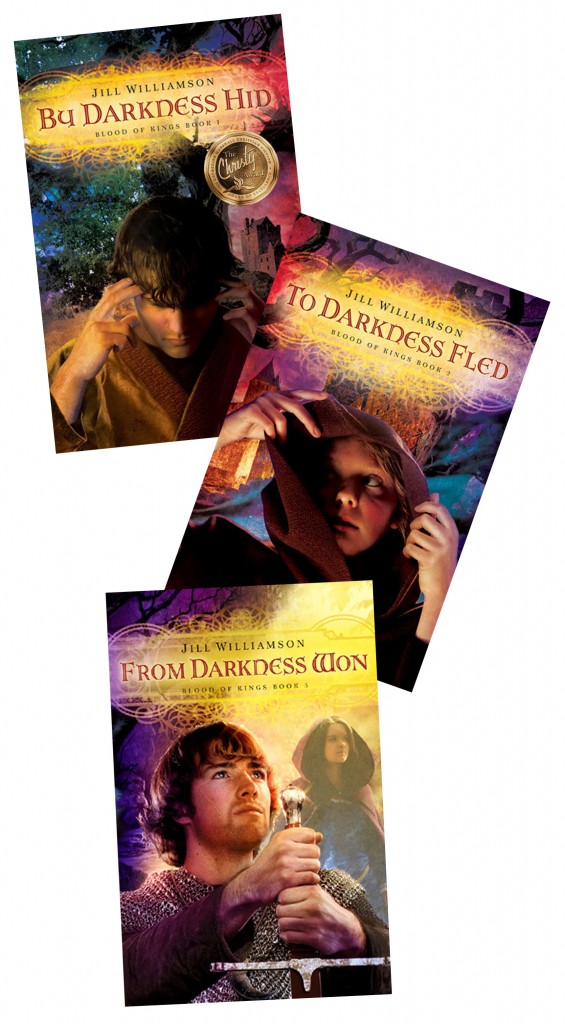
 I guess Iād say a mixture, then. The less we ā people who are against them throw a fit, the quicker they go away. A lot of times when you start saying This is an evil book! ā or whatever people might say ā kids just want to read it all the more. Instead of saying that, hand them a different book, if youāre concerned about it! Thereās some themes in there that can be dangerous, but thereās also some good themes in there. I think thereās more good themes in the Harry Potter books than I would think would be in Twilight. Twilight just is a little bit obsessive-relationship-themed. (Laughs) In my opinion!
I guess Iād say a mixture, then. The less we ā people who are against them throw a fit, the quicker they go away. A lot of times when you start saying This is an evil book! ā or whatever people might say ā kids just want to read it all the more. Instead of saying that, hand them a different book, if youāre concerned about it! Thereās some themes in there that can be dangerous, but thereās also some good themes in there. I think thereās more good themes in the Harry Potter books than I would think would be in Twilight. Twilight just is a little bit obsessive-relationship-themed. (Laughs) In my opinion!

